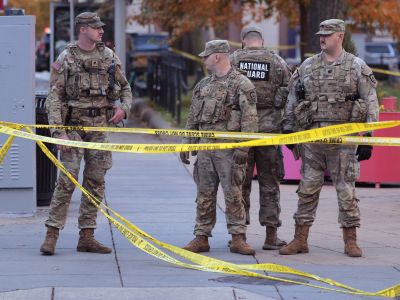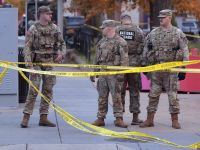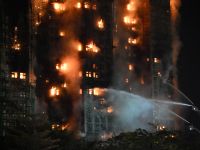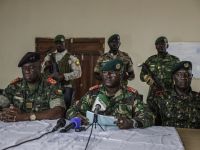The United States and Britain are proposing that the United Nations set a seven-day deadline for Iraqi President Saddam Hussein to agree to disarm and then open his palaces to weapons inspectors, a Bush administration official and U.N. diplomats disclosed Friday.
U.S. President Bush backed the U.N. effort, saying, "I'm willing to give peace a chance."
The tough demands are coupled with a warning that "all necessary means" would be used against Iraq in the event of defiance, the officials told The Associated Press. Describing the proposed U.N. resolution as tough and detailed, the U.S. official said Iraq would be accused of being in "material breach" of U.N. Security Council resolutions and told it must agree to "full, final and complete destruction" of its weapons of mass destruction.
If Saddam meets the first deadline and agrees to disarm, he would then have to quickly provide the council with a detailed account of materials in Iraq's possession which could be used to manufacture banned weapons, U.N. diplomats conveyed.
The resolution jointly proposed by the United States and Britain would give international inspectors the right to designate "no-fly" and "no-drive" zones as off-limits to Iraq.
The resolution would go further in denying Saddam control over parts of his country. The resolution would nullify assurances U.N. Secretary-General Kofi Annan gave Saddam in 1998 that would restrict inspections of presidential sites, including Saddam's palaces.
It also would detail Iraq's violations and specify what Baghdad must do to correct them, especially "full, final and complete destruction" of weapons of mass destruction.
The resolution was being circulated to attract the support of France, Russia and China. All three prefer giving Iraq another chance to have sites inspected before threats of force are leveled.
Bush called French President Jacques Chirac to try to win his backing for the U.S.-British proposal. But Chirac resisted, telling Bush he opposed threatening Iraq with military force upfront.
Chirac, instead, urged Bush to back a French approach for two separate resolutions, the first calling for weapons inspections and the second a threat of military action if Iraq balked.
Bush said the United Nations should have a chance to force Saddam to give up his weapons of mass destruction before the United States acts on its own against Iraq. "I'm willing to give peace a chance to work. I want the United Nations to work," Bush said. But he added action must come quickly.
"Now is the time," he said. "For the sake of your children's future we must make sure this madman never has the capacity to hurt us with a nuclear weapon, or to use the stockpiles of anthrax that we know he has, or VX, the biological weapons which he possesses."
"To work for peace — that's my goal," Bush declared. "There are a lot of good people on both sides of the political aisle who understand the task ahead."
"Our last choice is to commit our troops to harm's way. But if we have to, to defend our freedoms, the United States will lead a coalition and do so," Bush stated.
Iraqi response
Iraq on Saturday rejected as "unacceptable" the draft resolution. Vice President Taha Yassin Ramadan, speaking to reporters after attending a meeting of Arab professionals, said: "Our position on the inspectors has been decided and any additional procedure is meant to hurt Iraq and is unacceptable."
Deputy Prime Minister Tariq Aziz, on his part, warned at a seminar Saturday that the United States would suffer major losses if it invades Iraq.
"Any aggression on Iraq will not be a picnic, instead it will be a fierce fight where America will suffer losses that have not been sustained for decades," Aziz said. "Iraq is determined to resist and defeat any U.S. attack."
Aziz accused "Zionist circles" in Britain and the United States of pushing the two nations into war against Iraq to serve Israel, and added: "They (the Americans and the British) are trying to redraw the map of the Arab region in order to control its resources." (Albawaba.com)
© 2002 Al Bawaba (www.albawaba.com)









